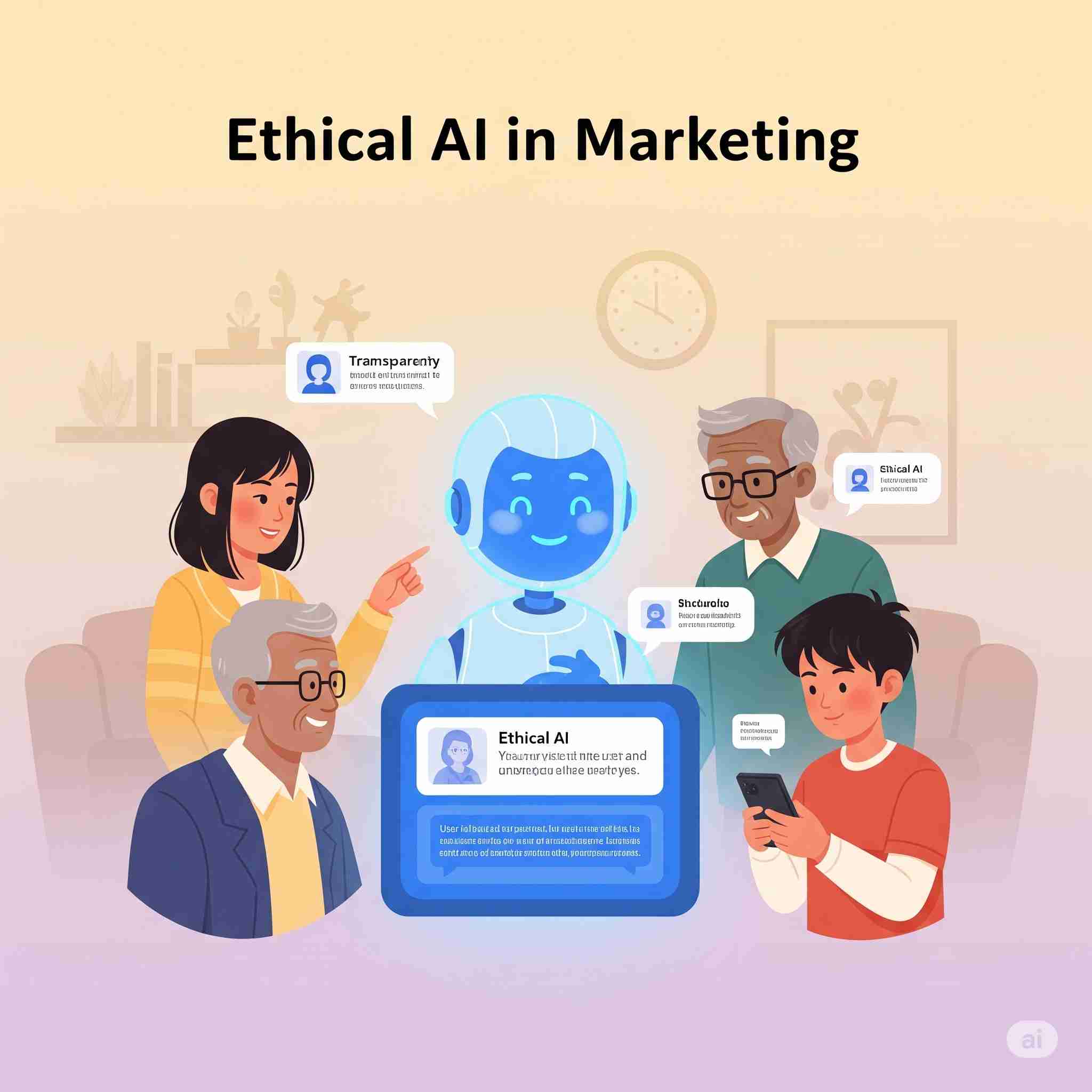Ethical AI in Marketing: The Future of Responsible Innovation
Artificial Intelligence (AI) is transforming the marketing landscape—improving efficiency, predicting customer behavior, automating tasks, and enabling hyper-personalized experiences. However, as businesses race to leverage AI tools for competitive advantage, a crucial conversation is gaining momentum: how do we ensure ethical use of AI in marketing? This blog explores the concept of ethical AI in marketing, highlighting the opportunities, challenges, and best practices for maintaining trust, transparency, and responsibility in AI-powered campaigns.
Why Ethics Matter in AI-Powered Marketing
AI in marketing can do remarkable things—from personalized recommendations and predictive analytics to chatbots and automated content creation. But this power comes with responsibility. The ethical concerns around AI aren’t just about compliance—they’re about maintaining human values in a world increasingly driven by algorithms.
Trust Is the New Currency
Consumers today are more informed and privacy-conscious. Trust is not easily earned—and is quickly lost. Brands that use AI without ethical consideration risk alienating their audience and damaging their reputation. Transparency, fairness, and accountability are not just ethical ideals—they’re business imperatives.
The Risk of Bias and Discrimination
AI systems learn from data. If that data is biased—due to historical inequalities or skewed sampling—the AI can unintentionally reinforce stereotypes or discriminatory practices. In marketing, this might show up in biased ad targeting, unfair credit offers, or exclusionary messaging.
Privacy and Consent
Collecting, storing, and using personal data without clear consent is a major ethical red flag. AI-driven marketing relies heavily on data, which raises questions around user privacy,informed consent, and data protection. The ethical use of data must go beyond legal compliance to respect the user's autonomy.
The Benefits of Ethical AI in MarketingThe Benefits of Ethical AI in Marketing
When used responsibly, AI can unlock immense value—for both businesses and consumers. Ethical AI doesn’t mean limiting innovation; it means shaping it with intention.
Enhanced Customer Relationships
AI that respects customer privacy and offers genuine value can deepen loyalty. Ethical personalization—where users know how their data is used and feel in control—builds trust and long-term engagement.
Sustainable Brand Image
Companies that adopt ethical AI practices are more likely to be seen as responsible, future-ready brands. This not only helps with public perception but also aligns with ESG (Environmental, Social, and Governance) initiatives that investors and stakeholders increasingly care about.
Future-Proofing Marketing Practices
Regulations like the GDPR, CCPA, and AI Act are setting the tone for ethical standards globally. Brands that embrace ethics early on are less likely to face compliance issues down the line.
Real-World Examples of Ethical AI Marketing
Several leading companies are already showing what ethical AI in marketing can look like.
Salesforce – Transparent AI Tools
Salesforce’s Einstein AI suite integrates ethics into its core by allowing marketers to see how predictions are made, identify bias, and adjust parameters for fairness.
Unilever – Bias Testing in Recruitment
Unilever uses AI for recruitment marketing but proactively tests for gender and racial bias in their algorithms. This approach ensures that their employer branding remains inclusive and fair.
IBM – AI Ethics Guidelines
IBM promotes AI ethics through its governance framework and marketing practices. Their AI Fact Sheets provide transparency about the capabilities and limitations of AI systems used in business contexts.
Key Ethical Principles in AI Marketing
To ensure AI serves marketing goals ethically, marketers should follow a set of guiding principles:
1. Transparency
Let users know when they are interacting with AI (e.g., chatbots) and how their data is being used. Avoid hidden algorithms that make decisions without explanation.
2. Accountability
Humans must remain responsible for the outcomes AI produces. If an AI campaign goes wrong—such as targeting minors with age-inappropriate ads—marketers must take responsibility and act swiftly.
3. Fairness
Ensure algorithms do not discriminate against individuals based on race, gender, age, or other protected characteristics. Regular audits and inclusive datasets are key.
4. Privacy
Respect user data. Go beyond compliance and focus on ethical data collection—ensure it's necessary, secure, and used in ways users understand and agree to.
5. Human Oversight
AI should support—not replace—human creativity and judgment. Ethical AI systems are those where humans remain in control of important decisions.
Challenges in Implementing Ethical AI in Marketing
While the intent to be ethical is good, implementation can be complex.
Data Dependency
AI needs large datasets to function well. However, accessing high-quality, unbiased, and privacy-compliant data is challenging. Organizations often struggle to strike a balance between personalization and privacy
Lack of Expertise
Ethical AI requires cross-functional collaboration between marketers, data scientists, legal teams, and ethicists. Many companies lack the internal knowledge or framework to evaluate ethical risks.
Black Box Problem
AI models—especially deep learning ones—can be difficult to interpret. When marketers can't explain how an AI made a decision, it raises ethical concerns around transparency and trust.
Conclusion: Make Ethics Your Competitive Edge
AI can revolutionize marketing—but only if it’s guided by strong ethical principles. In a world where customers are increasingly aware, regulators are tightening rules, and technology is evolving fast, ethical AI is not optional—it’s essential.





